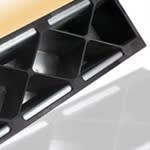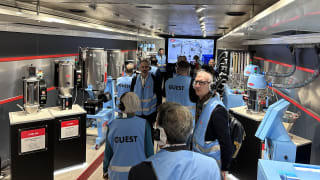 Mercedes will be using the adhesion promoter from Evonik Industries in several of its mass-produced models. Although it is used inside the vehicle and thus concealed from view, the VESTAMELT-based hybrid component performs an important job. The aluminum tubing connects both A-pillars together and supports the entire dashboard - from the steering wheel to the glove compartment.
Mercedes will be using the adhesion promoter from Evonik Industries in several of its mass-produced models. Although it is used inside the vehicle and thus concealed from view, the VESTAMELT-based hybrid component performs an important job. The aluminum tubing connects both A-pillars together and supports the entire dashboard - from the steering wheel to the glove compartment.These elements used to be welded or screwed together with metal connecting plates, a stable solution, but one that involves more weight. By contrast, VESTAMELT X1333-P1, a co-polyamide, covers the aluminum tubing and joins the holding brackets made of fiberglass-reinforced polyamide 6 of the individual components to the tubing by means of an injection molding process based on melt-bonding. When this adhesion promoter is used, component weight can be dramatically reduced by up to 20% compared to conventional solutions.
"Together with automobile manufacturers, we’re developing even more applications worldwide for VESTAMELT," says Martin Risthaus, the global business manager for Lightweight Design at Evonik. "Structural components or doors, for example, still have considerable weight-saving potential." Machine construction and the construction industry are also examples of segments in which the VESTAMELT concept can be applied to hybrid machine parts.
An EU Regulation requires that the emissions values of all vehicle fleets be drastically reduced by 2015. Replacing metal with plastic is an especially promising way to reach this weight-saving goal. The less a vehicle weighs, the less fuel it consumes, and thus the less carbon dioxide it emits.


